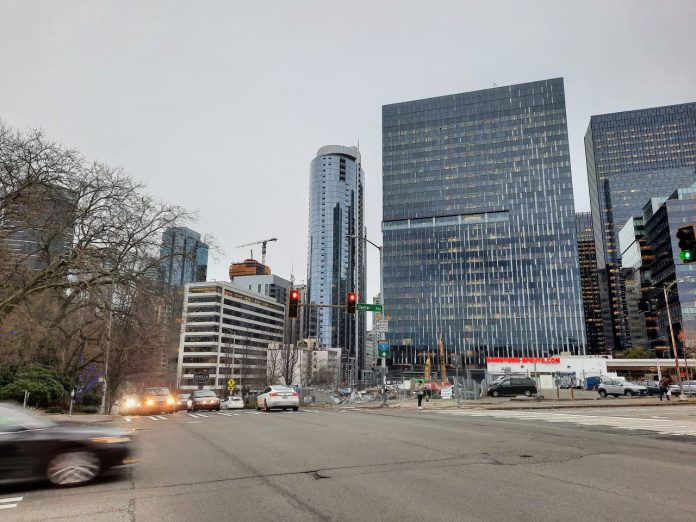
Big business is lobbying hard to make Sound Transit less efficient, more expensive.
Amazon and the Chamber are campaigning to “Save South Lake Union.”
Save it from what you might wonder?
Timely, effective, and affordable light rail, it turns out.
You see, Amazon is upset about normal construction disruption near its HQ – the very place it regularly threatens to abandon if we don’t give the company a deal on its taxes. They have decided that they should move the Sound Transit stations where businesses that don’t bring in hundreds of billions of dollars each quarter can deal with the disruption, thank you very much.
Per usual, their “but what about the small businesses?!” fainting couch is getting heavy use.
It seems they hope we forget they have put tens of thousands of small businesses into early graves and are currently being sued by the Feds for ripping off small businesses by abusing their monopoly power in their Amazon marketplace.
(Note, even the local community council thinks this whole thing is nuts!).
The upshot of their little plan? At least a year of delay and $500 million in extra cost for taxpayers, as well as 3,000 less riders per day, and a longer ride for those that remain. And possibly much worse. Alarmingly, Sound Transit Board member Bruce Harrell is starting to parrot their talking points, even making up his own ridership estimates.
As someone who cares about a functional transit system, and making good use of our tens of billions of dollars and 100+ year capital investment, our climate, and the credibility of the government, I find this all deeply disheartening.
But even if that were not the case, the hypocrisy alone would make my hair fall out, if I had any left.
The very people who spend most of their time saying they shouldn’t have to pay higher taxes because the government is inefficient and wasteful are spending a bunch of resources on trying to make the government inefficient and wasteful.
Writing about this reminded me of a moment from the campaign last year.
When I was at the Amazon forum, the “moderator” asked a (loaded) question that went something like:
“Given that the city budget has increased faster than inflation or population, do you really support adding new revenue sources to address the budget shortfall?”
This cute attempt at cleverness came from a study that a downtown lobby group had paid an economics firm to publish. It was a tired page from their Republican playbook of attempts to cry “waste, fraud, and abuse” so they can avoid paying their fair share of taxes.
I was expecting this silly question like this and so happened to be prepared.
I said “yes, I support new progressive revenue” and pointed out that the stat was misleading and economically illiterate; actual public finance experts would not expect a budget to grow at the same pace as inflation or population.
This is because the costs of activities like construction, or labor-intensive services, whether public or private, always go up faster than inflation. Any economist would know that the way you measure spending is as a percentage of the economy – and that had, in fact, gone down over the last 10 years at the state and local level.
Yes, that’s right, spending as a share of the economy is down, according to longtime Seattle Economist, Dick Conway.
These silly “statistics” are just one of a series of cynical moves by the players who are willing to ally with unsavory characters to get what they want on taxes. (A sadly familiar story to the one threatening democracy at the national level).
One such propaganda stat we see far too often comes from the Seattle Metropolitan Chamber of Commerce’s “Index” public opinion tracking poll, which asks cynical questions like “should the city focus on the basics?” that everyone of course responds “yes” to – and then spins this to mean whatever the chamber doesn’t like is frivolity and everyone wants them to have low taxes.
And too many new outlets, which should know better, tend to swallow and amplify their anti-tax message, buying into the veneer of professionalism a poll can provide for business talking points.
So, what can we do?
- Recognize the “Save South Lake union” campaign for the dishonest and cynical ploy that it is, and refuse to be ripped off.
- Realize that the origin of “government is inefficient” talk is largely a marketing campaign spun up by rich people and companies that disproportionately benefit from government investment (roads, schools, courts, etc.). They push these talking points because they don’t want to pay their taxes, not because they are honestly paying attention to what the government is or is not doing with its money.
- Recognize that one of the biggest sources of government inefficiency is the very kind of special interest capture Amazon is engaged in, and fight back against it by showing up to voice our support for investments in our city infrastructure, like a light rail station in a location that makes sense.
- Tax the rich so we don’t have to cut essential services like libraries and summer camps for youth.
- Write to the Sound Transit Board and tell them to reject this plan.
This article is a cross-post from Ron Davis’s Substack. Since it went to post, Transit Riders Union has launched an online petition to move forward in SLU and avoid delay.

Ron Davis (Guest Contributor)
Ron Davis is an entrepreneur, policy wonk, political consultant, and past candidate for Seattle City Council. He is focused on making his community a place where anyone can start a career, raise a family, and age in place without breaking the bank. He has a JD from Harvard Law School and lives in Northeast Seattle with his wife — a family physician — and their two boys.
